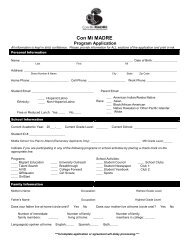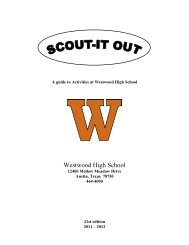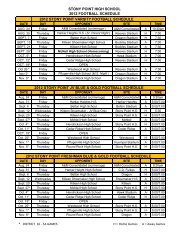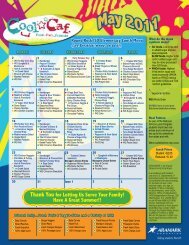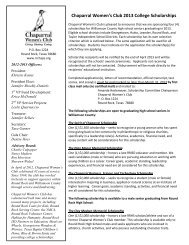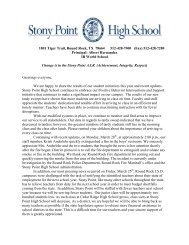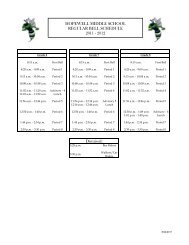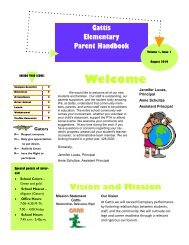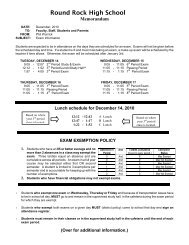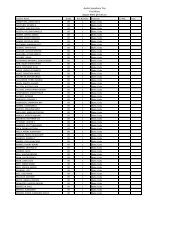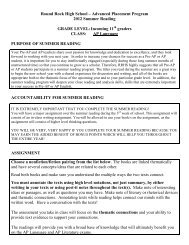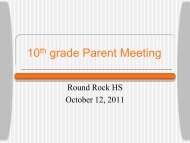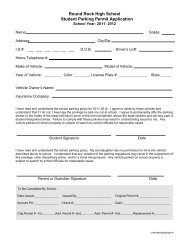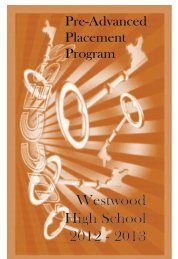Westwood High School 2012 - 2013
Westwood High School 2012 - 2013
Westwood High School 2012 - 2013
Create successful ePaper yourself
Turn your PDF publications into a flip-book with our unique Google optimized e-Paper software.
Advanced Placement<br />
Program<br />
<strong>Westwood</strong><br />
<strong>High</strong> <strong>School</strong><br />
<strong>2012</strong> - <strong>2013</strong>
ADVANCED<br />
PLACEMENT<br />
PROGRAM<br />
<strong>2012</strong>-<strong>2013</strong>
Table of Contents<br />
Introduction ................................................................ 1<br />
Measuring Success ........................................................ 2<br />
The Advanced Placement Programs ................ 3<br />
AP Information for Students ................................ 5<br />
AP Information for Parents ........................................ 6<br />
What <strong>Westwood</strong> Students Say about AP ........ 7<br />
College Costs and AP Courses ................................ 8<br />
Course Descriptions:<br />
AP Biology ........................................................................ 9<br />
AP Calculus AB ................................................................ 10<br />
AP Calculus BC ................................................................ 11<br />
AP Chemistry ................................................................ 12<br />
AP Chinese Language ................................................ 13<br />
AP Computer Science A ........................................ 14<br />
AP English III Language ................................................ 15<br />
AP English IV Literature ................................................ 16<br />
AP English III-IV TAG ................................................ 17<br />
AP Environmental Science ........................................ 18<br />
AP European History ................................................ 19<br />
AP French Language ................................................ 20<br />
AP German Language ................................................ 21<br />
AP Government ........................................................ 22<br />
AP Latin: Vergil ................................................................ 23<br />
AP Macroeconomics ................................................ 24<br />
AP Music Theory ........................................................ 25<br />
AP Physics B ................................................................ 26<br />
AP Physics C ................................................................ 27<br />
AP Psychology ................................................................ 28<br />
AP Spanish Language ................................................ 29<br />
AP Spanish Literature ................................................ 30<br />
AP Statistics ................................................................ 31<br />
AP United States History ........................................ 32<br />
AP World History ........................................................ 33<br />
................................................................................................
1<br />
The Hope of the Future<br />
For students from many backgrounds, the challenge of AP courses<br />
helps focus their interests as they begin to plan for their future.<br />
Research indicates this increased focus often results in additional<br />
college level course work in the areas for which AP credit was given.<br />
Frequently students will major in the subject area of their AP course<br />
work.<br />
AP courses, modeled on rigorous, evidence-based standards, give<br />
students the preparation they need not only to enter college -- but<br />
also to graduate. According to academic research, 45 percent of<br />
students taking just one AP Exam and 61 percent of students taking<br />
two or more AP Exams, graduate on time from college.
Measuring Success<br />
Newsweek “Top 100 <strong>School</strong>s” Current Rank - 47<br />
US News & World Report “Top <strong>High</strong> <strong>School</strong>s - Silver Ranking”<br />
Texas Monthly - Rated one of the Best Public <strong>School</strong>s<br />
U.S. Dept. of Education Honors in Technology<br />
Texas Education Agency Recognized Rating<br />
Texas Education Agency Successful <strong>School</strong>s Award<br />
Five Star Rating from Just for the Kids<br />
Austin Chamber of Commerce “<strong>High</strong>est Number of Students<br />
direct to Collegel” Award<br />
2011 AP Exam Results<br />
AP National Scholars......................................................................................... 45<br />
AP Scholars with Distinction....................................................................... 178<br />
AP Scholars with Honor................................................................................... 78<br />
AP Scholars......................................................................................................... 106<br />
AP Exam Candidates..................................................................................... 878<br />
AP Exams Scored............................................................................................ 2160<br />
Percentage of Scores 3 or higher........................................................ 85%<br />
2
3<br />
Advanced Placement Program<br />
What is the Advanced Placement (AP) Program?<br />
Advanced Placement (AP) is a program of college-level courses and<br />
exams that gives high school students the opportunity to receive<br />
advanced placement and/or credit in college. About 2.9 million<br />
students participate in the AP Program each year, usually<br />
through an AP course. <strong>Westwood</strong> oers 24 AP courses.<br />
What are AP courses?<br />
AP courses are introductory college courses, so they are not easy,<br />
but neither are they impossibly dicult. An AP course will be<br />
more demanding than a regular high school course. They often<br />
require more time and work, but the AP courses give you greater<br />
depth. A student should realize that taking an AP class is a<br />
serious commitment. Students should give careful thought to<br />
which and how many AP courses to take in one year. The purpose<br />
of this booklet is to help students clearly understand course<br />
requirements and expectations.<br />
Why take an AP Exam?<br />
Satisfactory grades on AP examinations oer many benets which<br />
may enhance your applications for college admissions, placement,<br />
and scholarships. You may also receive college credit based on<br />
your AP scores.<br />
AP exams are administered each year in May. An exam contains<br />
both multiple choice and free response questions that require<br />
essay writing, problem solving, and other skills. Every examination<br />
receives an overall grade on a ve-point scale.<br />
Scale:<br />
5 - Extremely well qualied<br />
4 - Well qualied<br />
3 - Qualied<br />
2 - Possibly Qualied<br />
1 - No Recommendation
...... continued<br />
AP Grade Reports are sent in July to each student’s home<br />
address, high school and, if the student has requested, to designated<br />
colleges.<br />
Each college decides how much credit to award for AP scores.<br />
You can nd this information for the college(s) you are interested<br />
in by using the AP Credit Policy search at:<br />
http://www.collegeboard.com/ap/creditpolicy/<br />
4
5<br />
AP Information for Students<br />
AP can change your life...and you don’t have to be one of the top<br />
students in your class! Through college-level AP courses, you enter a<br />
universe of knowledge that might otherwise remain unexplored in<br />
high school; through AP Exams, you have the opportunity to earn<br />
credit or advanced standing at most of the nation’s colleges and<br />
universities.<br />
Why Participate?<br />
With 24 courses to choose from, AP oers something for everyone.<br />
The only requirements are a strong curiosity about the subject you<br />
plan to study and the willingness to work hard. Here are just a few<br />
reasons to sign up:<br />
Broaden Your Intellectual Horizon:<br />
• Explore the world from a variety of perspectives, most importantly<br />
your own.<br />
• Study subjects in greater depth and detail.<br />
• Assume the responsibility of reasoning, analyzing, and under-<br />
standing for yourself.<br />
Gain the Edge in College Preparation:<br />
• Get a head start on college-level work.<br />
• Improve your writing skills and sharpen your problem solving<br />
techniques.<br />
• Develop the study habits necessary for tackling rigorous course<br />
work.<br />
Stand Out in the College Admissions Process:<br />
• Demonstrate your maturity and readiness for college<br />
• Show your willingness to push yourself to the limit<br />
• Emphasize your commitment to academic excellence
AP Information for Parents<br />
The AP Program gives students a chance to try college-level work in<br />
high school and gain valuable study habits. As a reward for their<br />
eorts, students earning a “qualifying” grade on an AP Exam, are<br />
given credit or advanced placement by thousands of colleges worldwide.<br />
AP Exams and courses oer students a chance to:<br />
• study a subject in greater depth<br />
• know her/his capabilities<br />
• gain a clearer idea of his/her future plans<br />
• develop skills and study habits vital to college<br />
• improve admission eligibility<br />
• prepare for the unexpected<br />
• save money<br />
• get a head start for college<br />
• become eligible for Scholars Awards<br />
Students should talk to their guidance counselors to see if AP<br />
courses are right for them.<br />
Student and Parents<br />
As students plan their schedules, they should also consider time<br />
commitments required in extracurricular and outside activities.<br />
Carefully review the course descriptions before you make your<br />
decisions.<br />
6
7<br />
What <strong>Westwood</strong> Students<br />
Say about AP<br />
• “My AP classes at <strong>Westwood</strong> really prepared me for UT. I see other<br />
students really struggling and I feel like I know what is expected<br />
and how to study.”<br />
• “AP courses are just more interesting.”<br />
• “I earned enough credits to double major in 3 years.”<br />
• “I earned a 3 and didn’t get credit for an AP course at A&M, but<br />
now I’m the best student in the class, so it really worked out<br />
pretty well for me.”<br />
• “You get treated more like a college student and less like a baby.”<br />
• “I know how to take notes and really study. My grades first<br />
semester are pretty high compared to others in my class.”<br />
• “I’m going to graduate in 2 1/2 years.”<br />
• “AP courses aren’t that hard. You just have to learn to study.”
College Costs and AP Courses<br />
Most colleges and universities grant from 3 - 12 hours credit for AP<br />
scores of four or five, many give credit for AP scores of three. In 2010,<br />
<strong>Westwood</strong> students earned scores of three or higher on 1,749 AP<br />
exams. For information on the credit granted for AP courses from<br />
college or university you are interested in, go to the following link:<br />
http://www.collegeboard.com/ap/creditpolicy/<br />
Average cost for one academic year at a Texas public university (15<br />
hours per semester x two semesters) for a Resident is as follows:*<br />
Tuition and fees $ 7,204<br />
Housing, meals (dormitory) 8,118<br />
Books and supplies 1,204<br />
Transportation 1,999<br />
Personal expenses 2,119<br />
Total $20,644<br />
Average cost for one academic year at a Texas private university (15<br />
hours per semester x two semesters) is as follows:*<br />
Tuition and fees $ 21,780<br />
Housing, meals (dormitory) 6,928<br />
Books and supplies 1,015<br />
Transportation 1,340<br />
Personal expenses 1,600<br />
Total $32,663<br />
*Source: CollegeForTexans.com - Get the Facts - College Costs<br />
8
9<br />
AP Biology<br />
Introduction: This college-level course is fast paced, in-depth, and<br />
appropriate for any student who enjoys learning about life by asking<br />
and answering questions. The course is built around inquiry based<br />
lavs and the application of science practice. Integration and application<br />
of biological principles is emphasized. Completion of Chemistry<br />
and Biology is a required prerequisite and needed for success.<br />
Specic skills for success:<br />
• Ability to read and understand large amounts of material independently<br />
Ability to think independently to synthesize and adapt models of<br />
the biological world.<br />
• Solid background in chemistry, biology, and mathematics<br />
• Ability to analyze information using deduction and inference<br />
• Self-motivation (a successful student will read and study every day)<br />
• Ability to express ideas clearly in writing<br />
Out-of-class commitments:<br />
Students should plan to devote at least 1 ½ hours to studying,<br />
lab report preparation and reading per block of class. Slower<br />
readers will need to adjust this time accordingly.<br />
Student comments:<br />
• “To be successful in this class you must be able to study independently.<br />
It’s a really fun class - it’s hard, but don’t let that discourage<br />
you. It’s very interesting.”<br />
• “It’s a lot of work but you feel like you’ve accomplished something<br />
after you do a lab or take a test.”<br />
• “I like AP Biology because it is a fun and challenging course.”<br />
• “Everyday, I know class will be interesting. Come into AP Bio<br />
willing to work hard and be sure to stay on top of the reading.”<br />
Text:<br />
• Biology 6th edition by Neil Campbell and Jane<br />
Reece published by Benjamin Cummings.<br />
Contact Person:<br />
• Kristine Keel kristine_keel@roundrockisd.org<br />
• Joy Killough joy_killough@roundrockisd.org
AP Calculus AB<br />
Introduction: The AP Calculus AB course is designed to prepare<br />
students to be procient at the college calculus level. Students are<br />
expected to take and be successful on the AP Calculus AB exam,<br />
thereby earning college credit for dierential calculus (approximately<br />
3 college hours). The class focuses on the study of dierential calculus<br />
with limited exposure to the early concepts of integral calculus. The<br />
concepts are presented and tested in the analytic (symbolic), graphical<br />
and tabular frameworks.<br />
Specic skills for success:<br />
• Very strong background in Precalculus, Geometry and Algebra II<br />
• Commitment to do homework<br />
• Ability to work independently<br />
• Intrinsic motivation to work hard<br />
• Problem solving skills<br />
Out-of-class commitments:<br />
• 1 hour problem solving per class<br />
• 1 hour preparation for quizzes<br />
• 2 hours preparation for tests<br />
• 4 - 6 hours preparation for semester exams<br />
• 12 - 18 hours preparation for the AP Exam<br />
Student comments:<br />
• “It is very abstract in nature. There is a lot of problem solving.”<br />
• “Do your homework.”<br />
• “Know trigonometry, including the unit circle.”<br />
• “Pay attention in class.”<br />
• “An AP Preparation book is helpful.”<br />
Text:<br />
• Calculus by Finney, Demana, Waits, Kennedy, 3rd edition<br />
• A graphing calculator is required (at least the equivalent<br />
of a TI-83 or better)<br />
Contact Person:<br />
• Craig Sullivan Craig_Sullivan@roundrockisd.org<br />
10
11<br />
AP Calculus BC<br />
Introduction: This course is designed for the students wishing to get<br />
credit for up to 6 semester hours of calculus while still in high school.<br />
The content is focused on the key foundational ideas relating dierential<br />
and integral calculus. Students should expect to apply the<br />
concepts in a variety of scenarios.<br />
Specic skills for success:<br />
• Exceptionally strong background in Geometry, Algebra II<br />
and Precalculus<br />
• Good time management for homework and test prep<br />
• Must work efficiently as individuals and in small groups<br />
Out-of-class commitments:<br />
• Approximately one hour for every hour in class reading<br />
each section of the book and doing the homework.<br />
• 2 - 4 hours preparation for tests<br />
• 4 - 6 hours preparation for semester exams<br />
• 12 - 18 hours preparation for the AP Exam<br />
Student comments:<br />
• “Must know the unit circle.”<br />
• “Do your homework everyday after class.”<br />
• ”Be an active participant in the class.”<br />
• ”Sometimes an AP prep book helps, sometimes not.”<br />
Text:<br />
• Calculus by James Stewart, 5th edition<br />
• A TI-83 or better calculator, but no “qwerty” keyboards<br />
Contact Person:<br />
• Craig Sullivan Craig_Sullivan@roundrockisd.org
AP Chemistry<br />
Introduction: This college course in general chemistry diers from<br />
the usual rst high school course in chemistry in respect to the range<br />
and depth of topics covered, the emphasis on chemical calculations,<br />
and the mathematical formulation of principles, the nature and<br />
variety of laboratory work done by students, and the time and eort<br />
required of students.<br />
Specic skills for success:<br />
• Good reasoning and math skills<br />
• Commitment<br />
• Good knowledge of Pre-AP or Accelerated Chemistry<br />
• Good study skills and time management<br />
• Lab Skills: manipulations and report<br />
Out-of-class commitments:<br />
Average 2 hours per class to practice problems, study for tests or<br />
quizzes, prepare and analyze the laboratories.<br />
Student comments:<br />
• “The topics covered are based on applications which help you<br />
learn. The course deals with a lot of labs: it gives you a good idea<br />
of what college science is like.”<br />
• “Don’t procrastinate. You need to complete the practice assigned.”<br />
• ”You have to keep up with the work because no one tells you to<br />
study; it helps to prepare for college.”<br />
• “Make sure you do the practice! Never fall behind. If you plan on<br />
going into a major that requires a knowledge of chemistry, this<br />
is a good class.”<br />
Text:<br />
• Chemistry (Zumdahl)<br />
Contact Person:<br />
• Chris Delbar christianna_delbar@roundrockisd.org<br />
12
13<br />
AP Chinese Language<br />
进阶先修<br />
Introduction: The AP Chinese Language course has been designed<br />
to be comparable to advanced level college/university Chinese<br />
language courses. It is intended for students who wish to develop<br />
prociency in all four language skills: listening, speaking, reading and<br />
writing; and who wish to explore further the beauty of the Chinese<br />
world.<br />
Specic skills for success:<br />
• Desire to communicate in Chinese<br />
• An understanding of Chinese language structure<br />
• Strong reading skill to be able to understand an authentic<br />
piece of literature<br />
• Strong listening and speaking skills to be able to comprehend<br />
and actively participate during class activities and discussions<br />
• Strong writing skills to be able to compose different kinds of<br />
essays<br />
Out-of-class commitments:<br />
• Approximately 1 hour per class meeting doing homework and/or<br />
studying to learn vocabulary and grammar<br />
• 1 - 2 extended projects per semester<br />
Text:<br />
• Integrated Chinese Level 2<br />
. Chaoyue: Advancing in Chinese<br />
• Novels, short stories, skits, poems and plays<br />
• Newspaper, magazine and online articles, essays, songs, movies<br />
and video clips which reect topics of current interest and/or<br />
historical signicance<br />
Contact Person:<br />
• Caley Tindal aley_Tindal@roundrockisd.org
AP Computer Science<br />
Introduction: This course provides students with a broad introduction<br />
to the world of computer programming. While studying software<br />
development, students will develop and rene invaluable skills in<br />
analytical thinking, logical and deductive reasoning, and general<br />
problem solving. Students are not required to have any prior experience<br />
with programming or computer science topics before taking the<br />
course.<br />
Specic skills for success:<br />
• Interest in programming and/or software development<br />
• Comfort with mathematical and logical reasoning<br />
• Ability to think creatively - Interest in puzzles and challenges<br />
• Ability to be precise and detail-oriented<br />
• Ability to generalize and think abstractly (to be developed<br />
throughout the course)<br />
Out-of-class commitments:<br />
With the exception of occasional practice exercises, most of the<br />
required work (including programming assignments) can be done<br />
in-class, using the classroom computers and software.<br />
Student comments:<br />
• “I enjoy the thrill of writing my own code and seeing it work."<br />
• ”This class moves at a good pace; fast enough to learn all you need<br />
in a year, but it isn't too hard. It's a good class that will teach you<br />
useful skills and help you think logically."<br />
• "The problem solving skills I've learned can be applied to all of my<br />
other classes."<br />
Resources:<br />
• Java SE Development Kit (JDK). Sun Microsystems.<br />
http://java.sun.com/<br />
• JCreator LE. Xinox Software. http://www.jcreator.com/<br />
Contact Person:<br />
• Jeff Mickel Jeffrey_Mickel@roundrockisd.org<br />
14
15<br />
AP English Language III<br />
Introduction: An AP course in English Language and Composition<br />
engages students in becoming skilled readers of prose written in a<br />
variety of periods, disciplines, and rhetorical contexts; and in<br />
becoming skilled writers who compose for a variety of purposes.<br />
Both their writing and their reading should make students aware of<br />
the interactions among a writer’s purposes, audience expectations,<br />
and subjects as well as the way generic conventions and the resources<br />
of language contribute to eectiveness in writing.<br />
Specic skills for success:<br />
• Self-discipline<br />
• Critical thinking, reading, and writing<br />
• Effective organizational and study skills<br />
• Time management<br />
Out-of-class commitments:<br />
• Reading assignments and writing activities commensurate with<br />
a college course.<br />
• Students can expect to spend one to two hours outside of<br />
class for every 90 minutes in class.<br />
Student comments:<br />
• “You should expect to increase your analytical and critical thinking<br />
skills.”<br />
• “Be prepared to think more in-depth. An AP student must go above<br />
and beyond the normal requirements.”<br />
• “I’m glad I chose this course because it has made me aware of the<br />
workload I will face in college.”<br />
Text:<br />
Students will be asked to purchase selected plays and novels.<br />
Contact Person:<br />
• Jennifer Cullen Jennifer_Cullen@roundrockisd.org<br />
• Elizabeth Davis Elizabeth_Davis@roundrockisd.org<br />
. Kathryn Hepfner Kathryn_Hepfner@roundrockisd.org
AP English Literature IV<br />
In . troduction: An AP English Literature and Composition course<br />
engages students in the careful reading and critical analysis of<br />
imaginative literature. Through the close reading of selected texts,<br />
students deepen their understanding of the ways writers use<br />
language to provide both meaning and pleasure for their readers.<br />
As they read, students consider a work’s structure, style, and themes<br />
as well as such smaller-scale elements as the use of gurative<br />
language, imagery, symbolism, and tone.<br />
AP courses, designed for students reading and writing two years<br />
above grade level, explore ction and nonction containing sophisticated<br />
concepts, themes and language. Titles are subject to change.<br />
Specic skills for success:<br />
• Critical thinking, reading, and writing<br />
• Effective organizational and study skills<br />
• Time management & Self Motivation<br />
Out-of-class commitments:<br />
Students can expect to spend one<br />
to two hours outside of class for<br />
every 90 minutes in class.<br />
Student comments:<br />
• “Be prepared to do all reading outside of class. There is no busy<br />
work; everything you do has a real purpose and aects your<br />
grade.”<br />
• “It is important to participate in class.”<br />
Text:<br />
• Literature: Reading Fiction, Poetry, and Drama (Robert DiYanni, 6th<br />
Edition)<br />
• Selected novels and plays (The Importance of Being Earnest, Hamlet,<br />
Rosencrantz and Guildenstern Are Dead, Heart of Darkness,<br />
The Awakening)<br />
Contact Person:<br />
• Sara Gaetjens Sara_Gaetjens@roundrockisd.org<br />
• Paula Holmes Paula_Holmes@roundrockisd.org<br />
. Kimberly Smith Kimberly_Smith@roundrockisd.org<br />
16
17<br />
AP English III-IV TAG<br />
Introduction: This is a two-year course of study designed to meet<br />
the needs of those students identied as talented and gifted in<br />
language arts while meeting the curriculum demands of the AP<br />
Language and Composition course and the AP Literature and Composition<br />
course. Readings, writings, and discussions will immerse<br />
students in literature from the Americas and the world.<br />
Specic skills for success:<br />
• Critical, creative, and productive thinking<br />
• Advanced understanding of English Language and Literature<br />
• Advanced understanding of the modes of writing<br />
• Self-directed learning that leads to completion of independent<br />
study projects<br />
• Evaluative approach to self and others<br />
Out-of-class commitments:<br />
Approximately one hour per class for reading, thinking, and writing<br />
associated with short- and long-term assignments for each area of<br />
study. Meetings with study/project groups are occasionally<br />
necessary. Commitment to completion of year long independent<br />
study project that reects a creative, research-based understanding of<br />
a topic selected.<br />
Student comments:<br />
• “Engaging reading and exciting interaction with expert reading<br />
groups.”<br />
• “Be prepared to read, read, read!”<br />
• “This isn’t just your ordinary English course! Projects and<br />
discussions are the best!”<br />
• “The Independent Study Project really allows us to engage in<br />
meaningful learning.”<br />
Text:<br />
• Literature, DiYanni<br />
• The Language of Composition , Shea, Scanlon and Aufses<br />
Contact Person:<br />
• Shirley Bachus Shirley_Bachus@roundrockisd.org
AP Environmental Science<br />
Introduction: AP Environmental Science is a year-long class designed<br />
to be the equivalent of a one-semester, introductory college course.<br />
This class approaches environmental problems, risks, and solutions<br />
from a multi-disciplinary perspective. Class work draws from chemistry,<br />
biology, geology, geography, economics and law. Outdoor eldwork,<br />
labs, discussion, basic environmental calculations, and readings<br />
from multiple sources are all used to understand environmental<br />
science concepts. Major topics covered include ecology, population,<br />
energy, pollution, atmosphere and change, conservation, and land<br />
use.<br />
Specic skills for success:<br />
• Ability to analyze and synthesize information from multiple<br />
science disciplines<br />
• Ability to express ideas clearly in writing<br />
• Strong basic calculation and mathematical problem solving skills<br />
as the AP Environmental Science test involves environmental<br />
calculations and does not allow calculators<br />
• Active participation in outdoor field work and activities is<br />
mandatory<br />
Out-of-class commitments:<br />
1 hour of homework (problems, labs, reading) per class<br />
2 hours preparation per test<br />
Text:<br />
Environmental Science - Earth as a Living Planet<br />
(5th Edition) Botkin and Keller<br />
Contact Person:<br />
• Chris Mihealsick Chritine_Mihealsick@roundrockisd.org<br />
18
Introduction: AP European History surveys major historical developments<br />
in Europe from about 1450 to the present, including Renaissance,<br />
Scientic Revolution, Enlightenment, French Revolution, World<br />
Wars, the Cold War, the fall of the Soviet Empire, the emergence of the<br />
European Union and other current European issues. The course uses<br />
primary sources, works of art, and other materials to explore diplomatic,<br />
political, social, and cultural history.<br />
Specic skills for success:<br />
• Enthusiasm for the study of history<br />
• Desire to develop college level reading and writing skills<br />
• Willingness to participate in classroom discussions<br />
• Commitment to completing homework assignments<br />
Out-of-class commitments:<br />
Varies according to a student’s study habits and skills. Usually<br />
about one hour per class, with extra time recommended for<br />
test review.<br />
Student comments:<br />
• “The subject is fascinating and I look forward to class.”<br />
• “I really learned to study better and read faster.”<br />
• “If you have taken AP US History you will be very well prepared<br />
for this class.”<br />
Text:<br />
• Mortimer Chamber, et al. Western Experience, 7th edition;<br />
• Dennis Sherman, Wester Civilization: Sources, Images, and Interpre-<br />
tation from the Renaissance to the Present, 4th edition.<br />
Contact Person:<br />
• Kelly Saenz kelly_saenz@roundrockisd.org<br />
19<br />
AP European History
AP French Language<br />
Introduction: The AP French Language course has been designed to<br />
be comparable to college/university French language courses. It is<br />
intended for students who wish to develop prociency in all four<br />
language skills: listening, speaking, reading, and writing, and who wish<br />
to explore further the beauty of the Francophone World.<br />
Specic skills for success:<br />
• Very successful completion (90 average) of Pre-AP French III<br />
• Strong motivation to learn French<br />
• Willingness to participate orally<br />
• Strong speaking skills<br />
• Strong reading and listening skills (only French will be used in class)<br />
Out-of-class commitments:<br />
Homework averaging 45 minutes to an hour per class.<br />
Student comments:<br />
• “Success in AP French IV depends on how comfortable you are with<br />
material covered in Pre AP French III. If you take notes and do<br />
homework diligently, you will have no problem on the AP test.<br />
If Pre AP French III was about learning the language, AP<br />
French IV is about using it.”<br />
• “There is a lot more writing in AP French IV. You also need to be<br />
able to speak uently and understand native speakers.”<br />
• “You must be able to read fluently in French with good pronunciation.<br />
You are responsible for learning, so you need to know how to<br />
manage your time.”<br />
Text:<br />
Reseaoue, Communication, Integration, Interactions (Schulz, Trainvouez)<br />
• Reprise (National Textbook Co)<br />
• French 4 Years (Francoise Shein)<br />
• Barron’s AP French<br />
• Bravo! (Heinle & Heinle)<br />
• Newspaper and magazine articles Authentik, essays, audiovisuals<br />
Mon JT quotidien and TV 5. Songs and videos are also used<br />
to compliment the main textbook.<br />
Breaking the French Barrier Advanced (C. Coursaget, M Myers)<br />
Contact Person:<br />
• Brigitte Rochard Brigitte_Rochard@roundrockisd.org<br />
20
21<br />
AP German Language<br />
Introduction: Students will be given opportunities to write longer<br />
essays, respond extemporaneously to oral prompts, write skits and<br />
act in short plays, develop reading strategies for understanding<br />
literary works, increase vocabulary and continue to improve listening<br />
skills.<br />
Specic skills for success:<br />
• A willingness to take risks and make mistakes when expressing<br />
oneself in a foreign language<br />
• A desire to communicate in German<br />
• The ability to listen<br />
• An understanding of language structure<br />
• Good writing techniques<br />
Out-of-class commitments:<br />
• Approximately 1 hour per class meeting doing homework and/or<br />
studying to learn vocabulary<br />
• 1 - 3 extended projects<br />
Student comments:<br />
• “You should be willing to participate in class discussion.”<br />
• “This course gives you a good idea of what college German is like.”<br />
• “The class has given me a chance to compete at higher level competitions.<br />
• ”I didn’t “<br />
mind the work because the class was fun.”<br />
Text:<br />
• Mitlesen, Mitteilen and Kaleidoskop<br />
• AMSCO, 2nd and 3rd years; review of advanced grammar concepts<br />
• Novels, short stories, skits, poems, and plays<br />
• Newspaper and magazine articles, movies and video clips and<br />
podcasts/videocasts which reect topics of current interest and/or<br />
historical signicance<br />
• Students should purchase a good German/English dictionary<br />
and verb book<br />
Contact Person:<br />
• J. J. Melgar Jennifer_Melgar@roundrockisd.org
Introduction: This course provides students with a comprehensive<br />
understanding of the operation of American government. The subjects<br />
that the course covers include constitutional arrangements; policymaking<br />
institutions such as the legislative, the executive, the bureaucracy,<br />
and the courts; public opinion and the media; political participation<br />
and voting behavior; political parties and interest<br />
groups; civil liberties and rights; and budget making. This course is<br />
designed to oer students the tools they need to become active and<br />
eective citizens in our democracy.<br />
Specic skills for success:<br />
• Students develop analytic perspectives for interpreting, understanding,<br />
and explaining political events in the United States.<br />
• Students recognize patterns of political behavior.<br />
• Students interpret and analyze data.<br />
Out-of-class commitments:<br />
3 - 5 hours per week<br />
AP Government<br />
Student comments:<br />
• “I gained insight on how our system of government works so I<br />
can eectively participate.”<br />
• “It helped prepare me for college level courses.”<br />
• “It made me more interested in what is happening in our country.”<br />
• “You must be motivated and regularly attend class or it is very<br />
dicult to pass.”<br />
Text:<br />
• Robert Lineberry, Geoege Edwards, and Martin Wattenberg. Government<br />
in America: People, Politics, and Policy. 10th ed. N.Y.:Addison<br />
Wesley, 2002<br />
Contact Person:<br />
• Bill Blaine bill_blaine@roundrockisd.org<br />
22
Introduction: Students will read excerpts from Vergil’s Aeneid, a star among<br />
epics of world literature, a tale of adventure, love, loss, warfare, and being a<br />
good Roman, and excerpts from Julius Caesar’s Gallic Wars, a commentary on<br />
Roman military campaigns on Roman military campaigns and the European<br />
tribes the Romans encountered on them. . Students will interpret and<br />
evaluate Latin literature. Through the reading of Latin literature, students will<br />
gain a deeper understanding of the modern world, its people and its<br />
languages.<br />
Specic skills for success:<br />
• Ability to read and interpret familiar<br />
and unfamiliar material in Latin<br />
• Willingness to participate in<br />
discussions<br />
• Ability to apply knowledge of cultural<br />
and historical background to analysis of literature<br />
• Solid background in reading and writing<br />
Out-of-class commitments:<br />
• An average of 20 minutes per class period preparing for<br />
vocabulary quizzes<br />
• 1 - 2 hours every week on grammar review<br />
• Preparation for about two tests per grading period<br />
Student comments:<br />
• “The material we learn is fascinating and it keeps me motivated<br />
to learn more. Also, I have found that I can use everything I learn<br />
in class somewhere else. It helps me a lot with my English class,<br />
and it even comes in handy in everyday life.”<br />
• ”Not only have I learned more Latin, but this course really made<br />
me think and understand the language as never before.”<br />
Text:<br />
Debello Gallico<br />
• A Song of War: Readings from Vergil’s Aeneid<br />
• Excelability in Advanced Latin<br />
• A Latin dictionary<br />
Contact Person: Jeanine Edson Jeanine_Edson@roundrockisd.org<br />
23<br />
AP Latin
AP Macroeconomics<br />
Introduction: Advanced Placement Macroeconomics deals with the<br />
way an entire economic system works. In this one-semester course,<br />
students will learn the general principles of economics, the way that<br />
the American economy works, and the critical role economic theory<br />
plays in government policy making. Students will learn about such<br />
relevant topics as: unemployment, ination, economic growth, international<br />
trade, government spending and taxation, and money and<br />
banking.<br />
Specic skills for success:<br />
• Ability to interpret graphs and charts<br />
• Ability to learn and apply new terminology<br />
• Ability to think logically<br />
• Good math skills (students who performed well in Algebra I<br />
and Geometry usually nd the conceptual nature of the course<br />
easy to grasp.)<br />
Out-of-class commitments:<br />
Approximately one hour for every hour in class<br />
Student comments:<br />
• “Take it, because it is interesting and you’ll be able to watch The<br />
News Hour and CNBC and understand the issues and policies<br />
being discussed.”<br />
• “It’s a cool class that makes you think and makes you more<br />
interested in current events.”<br />
• “This was a challenging class, but it opens up the world of<br />
economics to you -- it’s worth it.”<br />
Text:<br />
Economics (15th Edition) by McConnell and Brue<br />
Contact Person:<br />
• Bruce Doolittle bruce_doolittle@roundrockisd.org<br />
24
25<br />
AP Music Theory<br />
Introduction: This AP course is for students who plan to continue<br />
their study of music at the college level. It extends knowledge and<br />
skills learned in Music Theory I, including advanced notation, scales,<br />
melodic and harmonic intervals, chord structure, part writing, ear<br />
training, sightsinging and keyboard skills. This course involves<br />
composition, written and aural analysis, and score study. This course<br />
is taught using technology based music software and MIDI keyboard<br />
instruments.<br />
Specic skills for success:<br />
• Students should have a rudimentary knowledge of the musical<br />
keyboard.<br />
• Not necessary to be an accomplished pianist<br />
Out-of-class commitments:<br />
During composition projects, students may spend up to<br />
1/2 hour per night away from the class period on the notation<br />
and recording of compositions. However, most assignments<br />
will be completed in the class time because of the use of technology<br />
in the music lab.<br />
Student comments:<br />
• “Thank you for preparing us well for the AP test.”<br />
• “I am so amazed that my college theory course is easy after<br />
taking <strong>Westwood</strong>’s AP class.”<br />
• “I am now serving as my professor’s assistant at my college because<br />
my professor trusts my knowledge from the AP class.”<br />
Text:<br />
• Tonal Harmony by Stefan Kostka.<br />
Contact Person:<br />
• David Means David_Means@roundrockisd.org
AP Physics B<br />
Introduction: AP Physics B is an algebra-based college-level survey<br />
course that covers Newtonian mechanics, uid mechanics and<br />
thermodynamics, waves and optics, electricity and magnetism, and<br />
atomic and nuclear physics.<br />
It is the recommended course for those students planning on<br />
majoring in any of the life sciences (zoology, biology, or pre-med)<br />
and for students who want additional preparation for AP Physics C.<br />
Specic skills for success:<br />
• Strong Pre-AP Physics knowledge<br />
• Solid Algebra II knowledge and strong skills in use<br />
of basic trigonometry<br />
• Strong problem solving skills<br />
• Self-discipline and willingness to take responsibility<br />
for one’s own learning<br />
Out-of-class commitments:<br />
Approximately 60 minutes of homework (reading, problems, etc.)<br />
per night<br />
Student comments:<br />
• “Be prepared to do a lot of independent work at home.”<br />
• “You need to be able to accept lower grades than what you may<br />
be accustomed to making.”<br />
• “This class is giving me great background for college physics.”<br />
• “It has sparked my interest in ways to use class learning in ‘real life’<br />
situations.”<br />
Text:<br />
• Douglas C. Giancoli, Physics: Principles with Applications,<br />
5th Revised Edition<br />
• Scientific calculator required<br />
Contact Person:<br />
• Chow-Ling Chang Chow-Ling_Chang@roundrockisd.org<br />
26
27<br />
AP Physics C<br />
Introduction: Advanced Placement Physics C is a calculus-based<br />
physics course designed for students planning to major in physical<br />
science, math, or engineering in college. Calculus concepts are<br />
integrated within a problem-solving and lab-based physic curriculum,<br />
which includes topics under Newtonian mechanics and Electricity and<br />
Magnetism.<br />
Specic skills for success:<br />
• Pre-AP Physics or AP Physics B knowledge<br />
• Prior or current enrollment in Calculus (AB or BC)<br />
• Strong problem solving skills, including working with formal<br />
equations<br />
• Self discipline and a willingness to take responsibility for one’s<br />
own learning<br />
Out-of-class commitments:<br />
Approximately 60 minutes of homework (reading, problems,<br />
etc.) per night<br />
Student comments:<br />
• “Problem solving and theory are emphasized over computation.”<br />
• “Be prepared to work every night.”<br />
• “I liked the emphasis on group problem-solving over formal<br />
lectures.”<br />
• “I looked forward to class because of the strong sense of camaraderrie<br />
among classmates”<br />
• “I enjoyed the supportive environment.”<br />
• “A strong science and math background is definitely a plus.”<br />
Text:<br />
• Paul A. Tipler, Physics for Engineers and Scientists, 6th Edition<br />
• Scientific calculator required<br />
Contact Person:<br />
•Chow-Ling Chang Chow-Ling_Chang@roundrockisd.org
AP Psychology<br />
Introduction: Advanced Placement Psychology introduces students<br />
to the scientic study of behavior and mental processes, covering the<br />
seven major domains of research. The course is comparable to an<br />
introductory psychology course at most colleges and universities.<br />
Specic skills for success:<br />
• Ability to handle comprehensive independent reading of collegelevel<br />
texts and professional articles<br />
• Ability to critically analyze written material<br />
• Ability to take copious notes and move rapidly through material<br />
• Ability to work independently outside of class with disciplined<br />
work habits<br />
• An openness to new ideas, opinions, and perspectives, with a<br />
willingness to learn about and respect dierences in people<br />
Out-of-class commitments:<br />
Approximately 5 hours per week to read, complete vocabulary<br />
studies (required), and work through the study guide materials<br />
(optional after third chapter of the year).<br />
Student comments:<br />
• “This is a fascinating science that blends many subjects together,<br />
from biology to philosophy, from statistics to physics, from<br />
anatomy to biochemistry, and from neuroscience to theology.”<br />
• “You can’t be absent because what’s done in class is often not in<br />
the book.”<br />
• “Plan to make a daily commitment; don’t put this on a back<br />
burner.”<br />
• “What other college course allows you to make brains out of<br />
Play-doh?”<br />
Text:<br />
• Psychology 6th Edition David Myers. Worth Publishers. New York,<br />
NY: and Study Guide to accompany textbook<br />
Study Guide to accompany text<br />
Contact Person:<br />
• Katherine (Kay) Minter Kay_Minter@roundrockisd.org<br />
28
29<br />
AP Spanish Language<br />
Introduction: The AP Spanish Language course has been designed<br />
to be comparable to advanced level (fth- and sixth-semester or the<br />
equivalent) college/university Spanish language courses. It is<br />
intended for students who wish to develop prociency in all four<br />
language skills: listening, speaking, reading, and writing; and who<br />
wish to explore further the beauty of the Hispanic world.<br />
Specic skills for success:<br />
• Strong motivation to learn Spanish<br />
• Willingness to participate orally<br />
• Strong writing, reading, speaking and listening skills<br />
Out-of-class commitments:<br />
Homework averaging 2 hours per week.<br />
Student comments:<br />
• “La clase te ayuda a hablar español fuera de clase.”<br />
• “Es una clase productiva y divertida. Leemos historias,<br />
hablamos de tópicos divertidos y jugamos juegos.”<br />
• “Te involucra en la literatura de la lengua y no estás tan<br />
concentrado en la gramática.”<br />
Text:<br />
• Main Textbook: Kanter, Abby, (2005). Encuentros Maravillosos,<br />
Gramática a través de la literatura. Upper Saddle River, NJ:<br />
Pearson Prentice Hall.<br />
• *Newspaper and magazine articles, essays, audiovisuals,<br />
songs and videos are also used to complement the main<br />
textbook.<br />
Contact Persons:<br />
• MilyBett Llanos-Gremillion<br />
milybett_llanos-gremillion@roundrockisd.org<br />
• Brian McDonough brian_mcdonough@roundrockisd.org<br />
• Heidi Klein heidi_klein@roundrockisd.org
AP Spanish Literature and Culture<br />
Introduction: The AP Spanish Literature class approximates an introductory<br />
Hispanic Literature course typically taught at the college level. It<br />
will expose students to some of the nest works in the literary history of<br />
Spain and Latin America. These works include a wide variety of genres<br />
and types of discourse from dierent literary periods and geographical<br />
areas. They will be analyzed within a cultural, historical, and literary<br />
context.<br />
Specic skills for success:<br />
• Strong reading skills to be able to understand an authentic piece of<br />
literature<br />
• Strong listening and speaking skills to be able to comprehend and<br />
actively participate during class activities and discussions<br />
• Strong writing skills to be able to compose different kinds of essays<br />
• Strong motivation and willingness to contribute during class<br />
discussions<br />
Out-of-class commitments:<br />
• Depending on the level of difficulty, some of the reading will be done<br />
in class, but for the most part, it will be done at home. Essays and<br />
projects can be assigned as homework.<br />
• Homework should average approximately 2-3 hrs/wk during the first<br />
semester.<br />
Student Comments:<br />
• Debes tomar esta clase si te gusta leer. Tienes que leer mucho.<br />
• Las obras que leemos son interesantes y divertidas. Aprendemos<br />
sobre la historia y la cultura de los diferentes paises hispanos.<br />
Algunas son un poco diciles.<br />
• La clase nos ayuda mucho para pasar el examen AP.<br />
Primary Text:<br />
• Abriendo Puertas: Antología de la literatura en español Tomo I &<br />
Tomo II. (2003), Evanston, Illinois: Nextext-McDougal Littell<br />
* These two anthologies contain all the readings in the College Board AP<br />
Spanish Literature list.<br />
Contact Person: • Heidi Klein heidi_klein@roundrockisd.org<br />
30
31<br />
AP Statistics<br />
Introduction: This is an application-based, non-calculus introductory<br />
statistics course. Data collection, analyzing, and interpretation<br />
are explained using basic probability theories. The<br />
course is divided into four major areas: exploring data, sampling<br />
and experimentation, probability and random phenomena, and<br />
statistical inference. Real world examples and lab activities from<br />
a variety of disciplines showcase the broad applications of statistics.<br />
Specic skills for success:<br />
• Critical reading skills<br />
• The ability to effectively<br />
communicate statitical<br />
reasoning and mathematical<br />
work<br />
• Regular attendance<br />
Out-of-class commitments:<br />
• 1 hour of homework per class<br />
• 1 - 2 hours preparation for tests<br />
• 8 hour minimum preparation for the AP exam<br />
Student comments:<br />
• “Now that I’ve had statistics, I notice and understand the<br />
stats I hear on the news.”<br />
• “Excellent class for your senior year. It’s fun and I feel more<br />
prepared for college level work. This is not like any other<br />
math course. More reading, more writing, and most<br />
problems are interesting.”<br />
• “Buy your own calculator so you can practice at home.”<br />
Text:<br />
• Stats: Modeling the World by Bock<br />
Contact Person:<br />
• Penny Smeltzer penny_smeltzer@roundrockisd.org<br />
• Jason Ziebell jason_ziebell@roundrockisd.org
AP United States History<br />
Introduction: This is a survey course that will provide a broad<br />
overview of U.S. History. You will study topics ranging from pre-<br />
Columbian societies to the United States in the post-Cold War world.<br />
You will also be introduced to themes -- such as American Diversity,<br />
Religion, and War and Diplomacy intended to assist you in thinking<br />
conceptually about the American past.<br />
Specic skills for success:<br />
• Analytical reading, critical thinking, effective essay writing,<br />
and meaningful participation in classroom discussion<br />
• Possess a commitment to perform at the college level<br />
Out-of-class commitments:<br />
• Summer reading assignment (Reading selections announced<br />
approximately May 1st)<br />
• Approximately 12 pages of in-depth reading for each<br />
class meeting<br />
• Study groups (optional)<br />
• 2 hours preparation per class meeting at the beginning of<br />
the year; reading time typically decreases as skills improve<br />
Student comments:<br />
• “It has disciplined me to work harder and taught me how to<br />
manage my study hours.”<br />
• “It puts a new perspective on learning and that hard classes are<br />
actually really fun too!”<br />
• “It’s my favorite class because we learn so much and it’s very<br />
different from any way I have learned before. It has taught<br />
me a lot about being disciplined and not to back out of something<br />
because it is dicult.”<br />
Text:<br />
• American History: A Survey, Tenth Edition, by Alan Brinkley.<br />
ISBN 0-07-303390-1<br />
Contact Person:<br />
• Dale Fritch dale_fritch@roundrockisd.org<br />
• Josh Williams josh_williams@roundrockisd.org<br />
32
33<br />
AP World History<br />
Introduction: AP Wold History covers the span of recorded human<br />
history from approximately 8000 BCE to the present. The course<br />
provides students with an understanding of the evolution of global<br />
processes and human societies. Processes of change and continuity<br />
will be analyzed through the frameworks of periodization and<br />
historical themes. The ve major themes that provide the structure<br />
of the course include: interaction between humans and the environment;<br />
development and interaction of cultures; state-building,<br />
expansion, and conict; the creation, expansion, and interaction of<br />
economic systems; and the development and transformation of<br />
social structures.<br />
Specic skills for success:<br />
• Interest in history<br />
• Desire to develop college level reading and writing skills<br />
• Willingness to participate in classroom discussions<br />
• Commitment to completing reading and other assignments<br />
Out-of-class commitments: Amount of time needed outside of<br />
class varies according to a student’s study habits and skills.<br />
Students should allot 120 minutes outside of class for each class<br />
period. Additional time is needed for test preparation.<br />
Text:<br />
• World Civilizations: The Global Experience. Third Edition, AP<br />
Edition. Peter Stearns et. al., Pearson, Longman.<br />
Contact Person:<br />
• Timothy Bray Timothy_Bray@roundrockisd.org<br />
Misty Matthews Misty_Matthews@roundrockisd.org<br />
Clark Thompson Clark_Thompson@roundrockisd.org
May 7 AM<br />
AM<br />
PM<br />
May 8 AM<br />
AM<br />
May 9 AM<br />
AM<br />
PM<br />
May 10 AM<br />
PM<br />
May 11 AM<br />
AM<br />
PM<br />
May 14 AM<br />
AM<br />
PM<br />
PM<br />
2:30<br />
May 15 AM<br />
PM<br />
May 16 AM<br />
PM<br />
May 17 AM<br />
AM<br />
PM<br />
<strong>2012</strong> AP Exam Schedule<br />
May 7 - May 18<br />
Chemistry<br />
Environmental Science<br />
Psychology<br />
Computer Science A<br />
Spanish Language<br />
Calculus AB<br />
Calculus BC<br />
Chinese Lang & Culture<br />
English Literature<br />
Latin: Virgil<br />
German Language<br />
US History<br />
European History<br />
Biology<br />
Music Theory<br />
Physic B<br />
Physics C: Mechanics<br />
Physics C: Elec & Mag<br />
US Gov’t & Politics<br />
French Language<br />
English Lang & Comp<br />
Statistics<br />
Macroeconomics<br />
World History<br />
Microeconomics<br />
May 18 AM Spanish Literature



